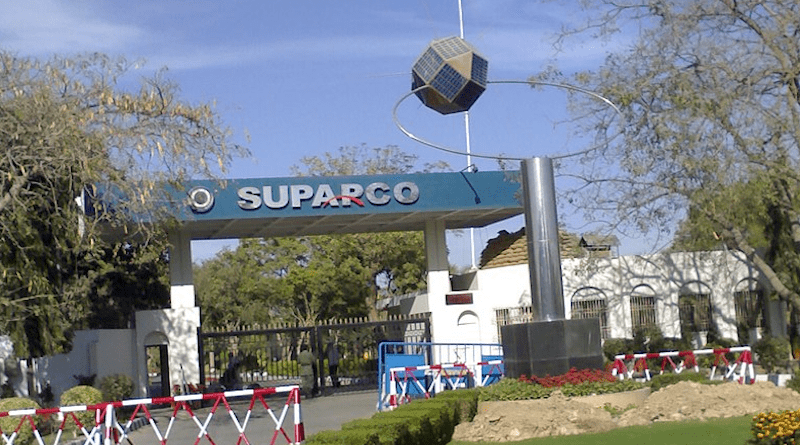Pakistan’s Space Program – OpEd
Currently, Pakistan’s space program is hanging in balance. It has been short of producing ample results as expected during its initial stages when in the 1960s it was flourishing and was one of the few countries to launch space rocket. With the passage of time because of many reasons such as lack of budget, dearth of expertise, scarcity of qualified space scientists as Suparco Chairmen, etc. have hampered its development.
Space and upper atmosphere reserach commission (SUPARCO) is mainly responsible for Pakistan space program which was established in 1961 as a wing of Pakistan Atomic Energy Commision (PAEC) under the chairmanship of Dr. Abdul Salam with the moto to strive to achieve self-reliance in space technology and application for self- security, economy, and society. It was a time when there was a closed competition between the USA and the former USSR during the peak of cold war.
Initially, Pakistan became an ally of America in space programme when both countries needed eachother collaboration. It was a juncture when the Indian Ocean was a crucial place with respect to wind dynamics of the upper atmosphere for which America needed data and Pakistan was a suitable ally. Hence, Pakistan came close with the USA and collaborated in space with America in lunar landing in the 1960s by cooperating in providing weather conditions data of the Arabian Sea.
Meanwhile, Pakista launched its first Rocket Rehbar 1 in June 1962 and Rehbar 2 a few days later with the cooperation of America. That milestone made Pakistan the thrid in Asia, first in Muslim world, first in South Asia, and the 10th country in the world for conducting a successful spacecraft. In 1962, America started to train Pakistani scientists, engineers, and technicians at Wallpos Island and the Goddard space flight centers. In 1964, Pakistan started to fabricate Rocket engines. In 1967, Rocketry development and reserach and aeronautic science was initiatived in Suparco and a Doppler Radar system in Islamabad was established.
More, in 1973, NASA,s Apollo 17 astronauts Eugene Cernan, Ronald Evans, and Harrison Schimit visited Karachi. In the 1970s Islamabad Ionospheric station was established while NASA,s landsat ground station was established near Rawat. In the 1970s the then Prime Minister Zulfaqar Ali Bhuto transfered many space Scientists to the PAEC and the KRL for nuclear purposes which was known a period of bureaucratisation and reorganization. That period also witnessed a pause in space programme. In addition to that, officer were appointed in space programme in 1981 when Munir Ahmad Khan reorganized and started missile programme again. Bureaucracy was involved in meeting where secretaries of finance, science, and economic ministries used to participate in those meetings. It was that period when hundreds of engineers were sent to University of Surrey in 1984 in England.
During the 1980s, Pakset communication satellite was launched in 1983 but due to lack of funds all programs were paused in 1983. In 1986 Badr 1 project was started which was launched in 1990. In 2012 Pakset- R was launched in geostationary orbit. In 2018 with the help of China Pakistan launched geo- sensing Saturday PRSS -1 and PAKtes- 1A. Moreover, the HATIF and Shaheen missile programmes were initiated with the help of KRL and played role in M11 missile.
Pakistan has an ambitious Space program known as Space programme 2040. It is a satellite development and launch plan which aims to replace geostationary communication satellite and Badr programmes. It aims to develop 5 GEO (Geosynchronous equatorial orbit) and 6 LEO (Low-earth orbit satellites). A few aims of the space programme included launching of solid-fuel rockets, geostationary orbit communication satellites, remote sensing, low-Earth orbit experimental satellites, space study, and applications in Pakistan. This programme lacks plan of Launch Vehicle. As Pakistan has no capability of launching satellites of its own In the orbit.
At present, Pakistan is becoming a close Space ally of China. It had shifted from American global positioning system (GPS) in 2014 to Chinese Beidou and became the first country to do so in the world. Pakistan has also purchased the PRSS Pakistan remote sensing system 1 and Paktes IA Pakistan technology evolution satellite in 2018 and launched these two satellites with the help of China,s own long March Rockets. In addition, Astronomy and astrophysics programmes were launched in 2012 aiming to do reserach in quantum physics, dark matter, energy, Supernova, and Nebulae.
Despite the above mentioned aims, the country,s space programme is still of low profile. Hurdles in Space programme included dearth of qualified Space Scientists as head of Suparco. For instance, in total 12 Chairmen there were 5 PhD, 5 BSC, 1 MS, and 1 CFI (certified flight instructor) Chairman respectively. Moreover, Pakistan Space satellites arelimited to communication satellite only. In addition, paucity of budget allocations for instance, Rs 7.39 billion were allocated in 2022-2023 bugdet. How can one expect Space development in the midst of such a low budgetary allocation. Apart from this, scarcity of teaching space syllabus is another impediment. There is a dire need to teach Space as a separate discipline in all Universities and subject from Matric to B.sc levels. This will help in increase technical staff.
At a time, when Pakistan was hoped to be an emerging Space power during the 1960s, has become short of development and growth of Space programme. At a juncture, when the world is focussing on space advancements, Pakistan is struggling. The more it is developed and paid heed the more it would be better. After the Indian progress in space, the need of progress in space programme for Pakistan increases more.


Why do all articles that compare SUPARCO vs ISRO devote so much time on the good old days? 80% of this article is all about what happened in 1960s.
What about where it all went wrong? And why is it still wrong? And when will it all change? And how?
Pakistan desperately needs economic development not space adventures.